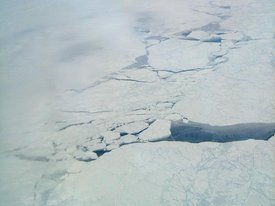Arctic Methane In Vicious Cycle Of Global Warming
By Common Dreams Staff
23 April, 2012
CommonDreams.org
 As the Arctic warms due to global warming, the Arctic Ocean itself may be releasing vast amounts of methane, contributing to even more global warming, according to a study published today in the journal Nature Geoscience.
As the Arctic warms due to global warming, the Arctic Ocean itself may be releasing vast amounts of methane, contributing to even more global warming, according to a study published today in the journal Nature Geoscience.
The researchers in the study led by Eric Kort of NASA’s Jet Propulsion Laboratory, Pasadena, Calif., recorded higher levels of methane above cracks in Arctic sea ice and areas of partial sea ice cover. The openings allowed Arctic seawater to interact with the air and methane in the surface waters to escape into the atmosphere. Higher methane readings were not found above solid ice.
“It’s possible that as large areas of sea ice melt and expose more ocean water, methane production may increase, leading to larger methane emissions,” Kort said.
“As Arctic sea ice cover continues to decline in a warming climate, this source of methane may well increase," he added.
* * *
Agence France-Presse: Arctic Ocean could be source of greenhouse gas: study
"We suggest that the surface waters of the Arctic Ocean represent a potentially important source of methane, which could prove sensitive to changes in sea-ice cover," [the study] says.
If so, the Arctic Ocean would add to several identified "positive feedbacks" in Earth's climate system which ramp up the greenhouse effect.
One such vicious circle is the release of methane from Siberian and North American permafrost.
The thawing soil releases methane that has been locked up for millions of years, which adds to global warming -- which in turns frees more methane, and so on.
But this is the first evidence that points to a methane contribution from the ocean, not the land, in Arctic latitudes.
* * *
NASA: Study Finds Surprising Arctic Methane Emission Source
The fragile and rapidly changing Arctic region is home to large reservoirs of methane, a potent greenhouse gas. As Earth’s climate warms, the methane, frozen in reservoirs stored in Arctic tundra soils or marine sediments, is vulnerable to being released into the atmosphere, where it can add to global warming. Now a multi-institutional study by Eric Kort of NASA’s Jet Propulsion Laboratory, Pasadena, Calif., has uncovered a surprising and potentially important new source of Arctic methane: the ocean itself. [...]
Kort said previous studies by others had measured high concentrations of methane in Arctic surface waters, but before now no one had predicted that these enhanced levels of ocean methane would find their way to the overlying atmosphere.
So how is the methane being produced? The scientists aren’t yet sure, but Kort hinted biological production from living things in Arctic surface waters may be a likely culprit. “It’s possible that as large areas of sea ice melt and expose more ocean water, methane production may increase, leading to larger methane emissions,” he said. He said future studies will be needed to understand the enhanced methane levels and associated emission processes and to measure their total contribution to overall Arctic methane levels.
“While the methane levels we detected weren’t particularly large, the potential source region, the Arctic Ocean, is vast, so our finding could represent a noticeable new global source of methane,” he added. “As Arctic sea ice cover continues to decline in a warming climate, this source of methane may well increase. It’s important that we recognize the potential contribution from this source of methane to avoid falsely interpreting any changes observed in Arctic methane levels in the future.”
* * *
New Scientist: Arctic methane leaks threaten climate
The findings will need to be replicated, says Euan Nisbet, an earth scientist at Royal Holloway, University of London. But if the leak is widespread across the Arctic, this mechanism could prove to be a significant source of greenhouse gas.
"We know the Arctic is warming very fast indeed," Nisbet says. And as the warming climate leads to more breaks in the sea ice, more ice-surrounded patches of open water will be able to release their methane, further accelerating global warming.
The question now is: how significant will this new effect on warming be? "It might be small," Nisbet says, "or it could be another serious problem."
Due to a recent spate of abusive, racist and xenophobic comments we are forced to revise our comment policy and has put all comments on moderation que.


